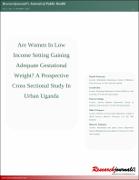Are Women In Low Income Setting Gaining Adequate Gestational Weight? A Prospective Cross Sectional Study In Urban Uganda

View/
Date
2016Author
Wanyama, Ronald
Obai, Gerald
Odongo, Pancras
Kagawa, Mike N.
Baingana, Rhona K.
Metadata
Show full item recordAbstract
Introduction: Pre-pregnancy weight and weight gained during pregnancy significantly influence maternal and
infant health. Little information is available regarding prevalence of optimal GWG in relation to pre-pregnancy
body mass index (BMI) in Uganda. This study aimed at determining the prevalence of inadequate, adequate
and excessive GWG in women pregnant for the first and second time.
Methods: The study was prospective cross sectional by design and involved HIV negative women pregnant for
the first or second time. It was conducted in a health centre IV and recruitment women at ≤18 weeks of gestation.
Follow up measurements were done at 26 and 36 weeks gestation age. Maternal height and weight were
measured and used to calculate BMI. Depending on BMI category, GWG was categorized as inadequate,
adequate and excessive based on the Uganda Ministry of Health guidelines.
Results: The participants’ mean±standard deviation (Sd) age was 20.9±2.7 years and mean±Sd BMI was
21.40±2.73kg/m2. None of the participants was obese and 68.8% (n=132) were primigravidae. The mean±Sd
GWG at time of delivery was 10.58±2.44kg. Inadequate GWG was recorded in 62.5% (n=120/192) while only
3.1% (n=6/192) of the participants gained excessive gestational weight.
Conclusion: About 62% of primigravidae and secundigravidae in low income urban Kampala do not gain
adequate gestational weight
Collections
- Research Articles [17]
